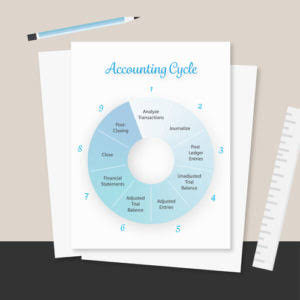
Shares outstanding and floating stock are two types of share-number metrics that are important for investors. Although they both refer to all classes of a company’s common stock (as opposed to preferred stock), these two metrics are inherently different. Shares outstanding (or outstanding shares) are any shares that are held by shareholders and company insiders.
- Yarilet Perez is an experienced multimedia journalist and fact-checker with a Master of Science in Journalism.
- Outstanding shares play a crucial role in determining a company’s market capitalization, a key metric for investors assessing a firm’s overall value.
- Conversely, a reverse stock split reduces the number of outstanding shares.
- Calculating the number of outstanding shares a company has can help you to understand what proportion of a company’s stock is held by its shareholders.
- A recent example of a reverse stock split is General Electric’s (GE) 1-for-8 reverse stock split during the summer of 2021.
- Companies typically issue shares when they raise capital through equity financing or when they exercise employee stock options (ESOs) or other financial instruments.
Add the Preferred and Common Stock, Then Subtract the Treasury Shares
All offers of employment are subject to an enhanced Disclosure and Barring Service (DBS) check, references, an online search, and where applicable, a prohibition from teaching check will be completed. Year 11 GCSE results consistently place the Academy in the highest percentile in the country.Ofsted ‘Pupils achieve exceptional outcomes in public examinations. We Fools may not all hold the same opinions, but we all believe that considering a diverse range of insights makes us better investors. Please note that by submitting the above mentioned details, you are authorizing us to Call/SMS you even though you may be registered under DND. Yarilet Perez is an experienced multimedia journalist and fact-checker with a Master of Science in Journalism. She has shares outstanding formula worked in multiple cities covering breaking news, politics, education, and more.
- The number is used to calculate many common financial metrics, such as earnings per share (EPS) and market capitalization.
- It is essential to note that outstanding shares can fluctuate due to events such as stock buybacks or secondary offerings.
- With the $50 million in cash, in theory it could instantly repurchase 5 million shares at $10 each.
- Outstanding shares impact a company’s market capitalization, which is calculated by multiplying the stock price by the number of outstanding shares.
- Please note that by submitting the above mentioned details, you are authorizing us to Call/SMS you even though you may be registered under DND.
- Market cap is the total value of all the company’s outstanding stock, or the total number of outstanding shares times the current stock price.
- Notably, stock splits and reverse stock splits significantly influence the number of outstanding shares.
What Is the Difference Between Shares Outstanding and Floating Stock?

In other terms, shares held by any market participant (Retailers, HNIs, and Institutional investors) and company insiders are called outstanding shares. Outstanding shares are used to calculate the market capitalization of a company, which is one of the most important parameters while analyzing a company. The number of outstanding shares of a company changes constantly and is used to calculate its market capitalization.

Authorized vs. Issued and Outstanding Shares
- Issued and outstanding shares are the total number of shares that are already in the hands of founders, investors, and employees/advisors/contractors.
- This is a figure calculated by the company itself; investors literally do not have the access to the data required.
- The number of shares outstanding increases if a company sells more shares to the public, splits its stock, or employees redeem stock options.
- This category includes already-issued stock along with shares that have the management’s approval but have not, yet, been released onto the trading market—including stock options.
- For example, the difference between the number of shares currently outstanding and the number of shares fully diluted is comparatively likely to be significant for fast-growing technology companies.
- In general, stocks with low floats will experience more volatility than those with large floats.
Outstanding shares are an important aspect of stock market trading as they have a direct impact on the company’s market capitalization and shareholder equity. The number of shares can fluctuate over time depending on the funding needs and growth trajectory of the company. As you look through a company’s financial documents, don’t confuse outstanding shares with issued shares, which is a slightly different category and includes treasury stock. The weighted average shares outstanding figure smooths out this variance, by simply averaging the share count across the reporting period. This is a figure calculated by the company itself; investors literally do not have the access how is sales tax calculated to the data required.
- Dividing the number of shares to be purchased by the number of shares outstanding reveals the percentage of ownership that the investor will have in the business after the shares have been purchased.
- Let us understand where investors and analysts can find the data regarding the total outstanding shares of a company through the points below.
- The number of outstanding shares of a company changes constantly and is used to calculate its market capitalization.
- The company has issued these shares, and are in the hands of investors who may buy and sell them on the open market.
- Here, the balance sheet reports 8,019 million shares issued and 3,901 million treasury shares, as of September 30, 2022.
- At the time, GE discussed plans to split into three companies and to divest from many businesses.
In a 1-for-2 reverse split, however, the number of shares is divided by two, while the share price doubles. Reverse stock splits often happen when a company needs to keep its share price above a certain level in order to remain in compliance with an exchange’s listing requirements. Outstanding shares impact a company’s market capitalization, which is calculated by multiplying the stock price by the number of outstanding shares.

Weighted average shares outstanding-
Like a company’s outstanding shares, a company’s float also changes on a consistent basis. Authorized shares represent the third share-number metric that investors often look at to get a comprehensive overview of a company’s stock shares. These are the maximum number of shares that a corporation is legally permitted to issue. This category includes already-issued https://www.facebook.com/BooksTimeInc stock along with shares that have the management’s approval but have not, yet, been released onto the trading market—including stock options. Outstanding shares play a crucial role in determining a company’s market capitalization, a key metric for investors assessing a firm’s overall value.

